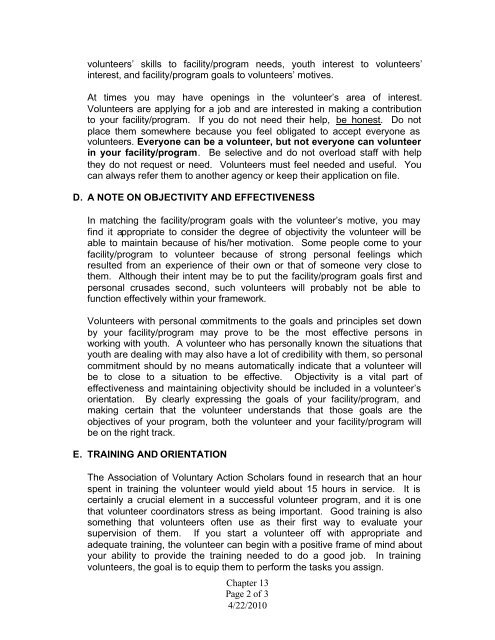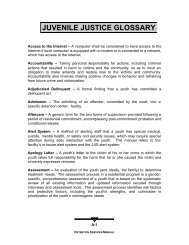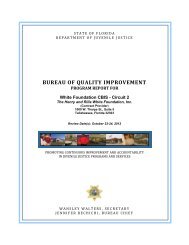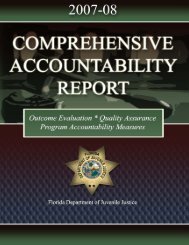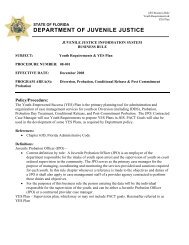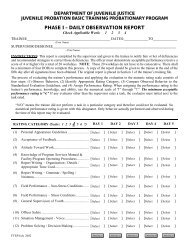Volunteer Coordinator Manual - Florida Department of Juvenile Justice
Volunteer Coordinator Manual - Florida Department of Juvenile Justice
Volunteer Coordinator Manual - Florida Department of Juvenile Justice
- No tags were found...
Create successful ePaper yourself
Turn your PDF publications into a flip-book with our unique Google optimized e-Paper software.
volunteers’ skills to facility/program needs, youth interest to volunteers’interest, and facility/program goals to volunteers’ motives.At times you may have openings in the volunteer’s area <strong>of</strong> interest.<strong>Volunteer</strong>s are applying for a job and are interested in making a contributionto your facility/program. If you do not need their help, be honest. Do notplace them somewhere because you feel obligated to accept everyone asvolunteers. Everyone can be a volunteer, but not everyone can volunteerin your facility/program. Be selective and do not overload staff with helpthey do not request or need. <strong>Volunteer</strong>s must feel needed and useful. Youcan always refer them to another agency or keep their application on file.D. A NOTE ON OBJECTIVITY AND EFFECTIVENESSIn matching the facility/program goals with the volunteer’s motive, you mayfind it appropriate to consider the degree <strong>of</strong> objectivity the volunteer will beable to maintain because <strong>of</strong> his/her motivation. Some people come to yourfacility/program to volunteer because <strong>of</strong> strong personal feelings whichresulted from an experience <strong>of</strong> their own or that <strong>of</strong> someone very close tothem. Although their intent may be to put the facility/program goals first andpersonal crusades second, such volunteers will probably not be able t<strong>of</strong>unction effectively within your framework.<strong>Volunteer</strong>s with personal commitments to the goals and principles set downby your facility/program may prove to be the most effective persons inworking with youth. A volunteer who has personally known the situations thatyouth are dealing with may also have a lot <strong>of</strong> credibility with them, so personalcommitment should by no means automatically indicate that a volunteer willbe to close to a situation to be effective. Objectivity is a vital part <strong>of</strong>effectiveness and maintaining objectivity should be included in a volunteer’sorientation. By clearly expressing the goals <strong>of</strong> your facility/program, andmaking certain that the volunteer understands that those goals are theobjectives <strong>of</strong> your program, both the volunteer and your facility/program willbe on the right track.E. TRAINING AND ORIENTATIONThe Association <strong>of</strong> Voluntary Action Scholars found in research that an hourspent in training the volunteer would yield about 15 hours in service. It iscertainly a crucial element in a successful volunteer program, and it is onethat volunteer coordinators stress as being important. Good training is alsosomething that volunteers <strong>of</strong>ten use as their first way to evaluate yoursupervision <strong>of</strong> them. If you start a volunteer <strong>of</strong>f with appropriate andadequate training, the volunteer can begin with a positive frame <strong>of</strong> mind aboutyour ability to provide the training needed to do a good job. In trainingvolunteers, the goal is to equip them to perform the tasks you assign.Chapter 13Page 2 <strong>of</strong> 34/22/2010


